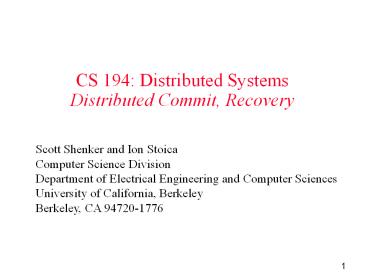CS 194: Distributed Systems Distributed Commit, Recovery - PowerPoint PPT Presentation
Title:
CS 194: Distributed Systems Distributed Commit, Recovery
Description:
Goal: Either all members of a group decide to perform an operation, or ... 15. Stable Storage Recovery. Stable Storage. Crash after drive 1 is updated. Bad spot ... – PowerPoint PPT presentation
Number of Views:105
Avg rating:3.0/5.0
Title: CS 194: Distributed Systems Distributed Commit, Recovery
1
CS 194 Distributed SystemsDistributed Commit,
Recovery
Scott Shenker and Ion Stoica Computer Science
Division Department of Electrical Engineering and
Computer Sciences University of California,
Berkeley Berkeley, CA 94720-1776
2
Distributed Commit
- Goal Either all members of a group decide to
perform an operation, or none of them perform the
operation
3
Assumptions
- Failures
- Crash failures that can be recovered
- Communication failures detectable by timeouts
- Notes
- Commit requires a set of processes to agree
- similar to the Byzantine general problem
- but the solution much simpler because stronger
assumptions
4
Two Phase Commit (2PC)
Coordinator
Participants
send VOTE_REQ to all
send vote to coordinator if (vote no)
decide abort halt
if (all votes yes) decide commit send
COMMIT to all else decide abort send ABORT
to all who voted yes halt
if receive ABORT, decide abort else decide
commit halt
5
2PC State Machine
- The finite state machine for the coordinator in
2PC - The finite state machine for a participant
6
2PC Crash Recovery Protocol
- Stable storage is persistent memory that supports
writes that are atomic with respect to failures - Log actions
- c sends VOTE_REQ write start
- p votes YES write yes
- p votes NO write abort
- c decides commit write commit
- c decides abort write abort
- p receives decision write decision
commit point
7
2PC Crash Recovery Protocol
- Upon recovery a process r starts reading the
values logged to stable storage. - If there is a start then r was the coordinator
- If there is a subsequent abort or commit then
decision was made otherwise decide abort. - Otherwise, r was a participant
- If there is abort or commit then the decision was
made - If there is no yes then decide abort.
- Otherwise (i.e., there is an yes record) run
termination protocol. - ... when can these records be garbage collected?
8
Recovery Techniques Checkpoints
- Goal recover a process from error
- Backward recovery checkpoint the state of the
process periodically - Go to previous checkpoint, if error
- Problem same failure may repeat
- Forward recovery go to a known good state if
error - Problem need to know in advance which error may
occur
9
Example Reliable Communication
- Backward recovery retransmit packet if lost
- Forward recovery use erasure coding
- Instead of sending k packets, send n gt k using
erasure coding - As long as receiver gets at least k packets out
of n, it can reconstruct the original k packets
10
Recovery Techniques Message Logging
- Sender based sender logs message before sending
it out - Receiver based receiver logs message before
delivering it - Replay log messages between checkpoints ? restore
state beyond most recent checkpoint
11
Distributed Checkpointing Recovery Line
- Recovery line most recent snapshot
- If a process P has recorder the receipt of
message m there should be a process Q that
recorded sending of message m - How do you find a recover line?
12
Independent Checkpointing The Domino Effect
- Domino effect cascaded rollback to find a
recovery line - Solutions
- Coordinate checkpointing use two-phase
non-blocking protocol (see the book) - Logging and replaying messages
13
Message Logging and Checkpointing
- Incorrect replay of messages after recovery,
leading to an orphan process
14
Stable Storage
- Storage designed to survive anything except major
calamities - Use two disks to record identical information
- Write and verify sector on disk 1
- Write and verify sector on disk 2
- Recovery
- Verify all sectors
- If two corresponding sectors differ, copy sector
from disk 1 to disk
15
Stable Storage Recovery
- Stable Storage
- Crash after drive 1 is updated
- Bad spot































